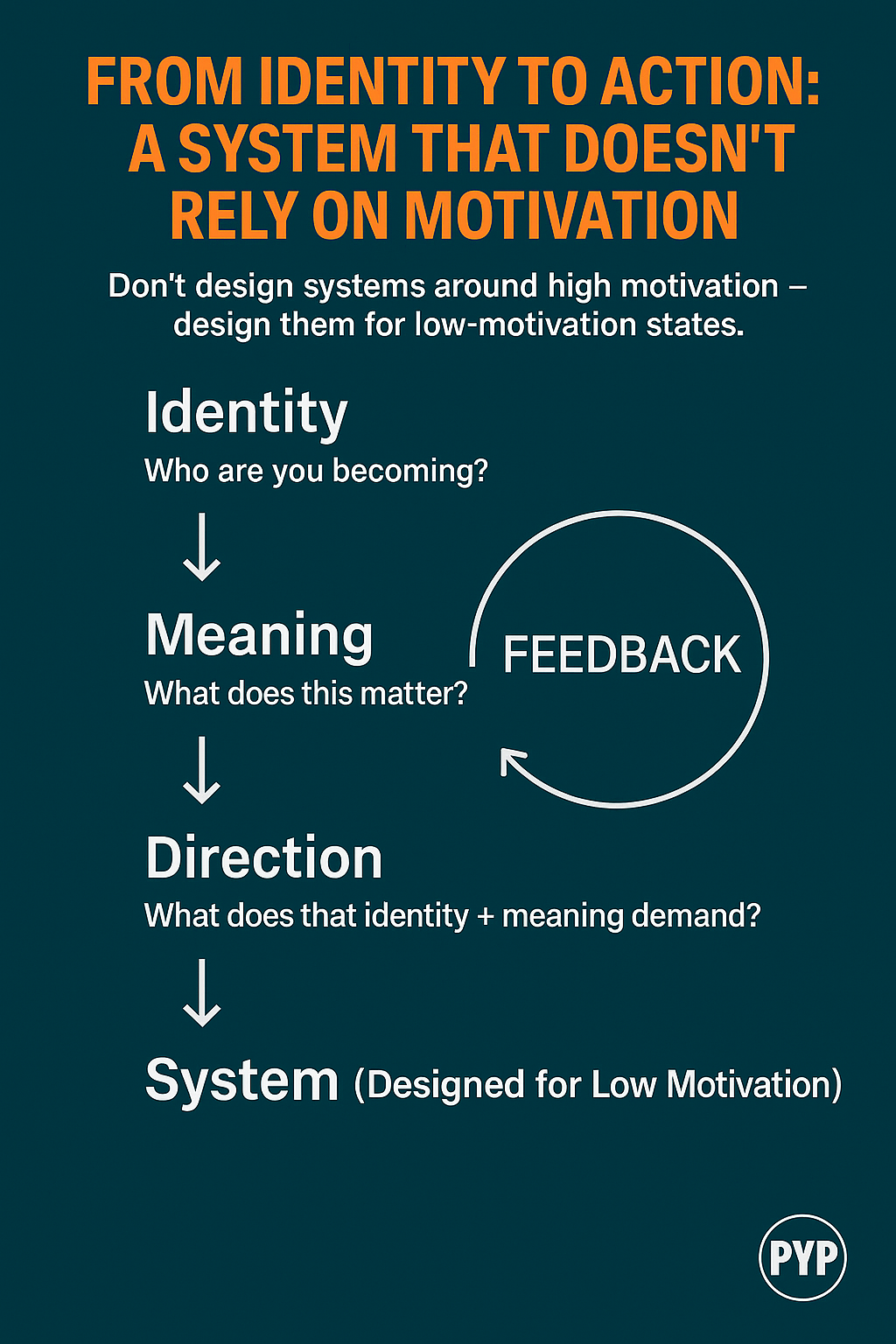The motivation myth is real.
In Episode 19 of Past Your Prime, Craig Smith and Alex Keicher tackle one of the most overhyped and misunderstood topics in rehab and training: motivation. This episode isn’t about pumping you up — it’s about pulling back the curtain on why motivation so often fails and what actually drives long-term consistency when life gets chaotic.
Why Motivation Is Overrated
Craig opens the episode by challenging a common belief: that motivation is the key to progress. In reality, motivation is fickle. It disappears when pain flares up, when you’re tired, when life gets in the way. That’s why relying on motivation is a bad strategy — especially in rehab, where consistency trumps intensity every time.
Instead, what matters is meaning. If your long-term purpose is strong enough, you’ll show up even when the drive isn’t there. It’s not about feeling fired up — it’s about being clear on why it matters.
Systems Beat Willpower
Alex shares a late-night story many can relate to: exhausted, in pain, tempted by bed — but still making it to the gym. Not because he felt like it. Because his system was in place. Clothes laid out. Bag packed. No excuses.
They unpack it together, with Craig drawing from his clinical experience: systems reduce the friction of showing up. They create repeatable cues and behaviors that don’t depend on your emotional state.
Want to stay consistent? Stack habits, not hope.
When Motivation Becomes the Problem
This episode takes a sharp turn when Craig explains how over-motivation can backfire. Alex, riding a wave of confidence, pushes past his tissue capacity and ends up with multiple new injuries. It’s a classic Phase 3 rehab issue: activity progression outpacing tissue readiness.
High motivation can lead to overreaching, which means more time managing setbacks. Craig reframes these moments not as failures, but as necessary learning loops — part of developing better body awareness and training intelligence.
Meaning, Identity, and Long-Term Change
What drives Alex isn’t motivation — it’s identity. He’s a dad, pro volleyball athlete, and someone who refuses to let life’s chaos break his training routine. That identity fuels his decisions, even when energy is low. Craig argues this is the future of rehab and training: building systems aligned with your meaning.
But identity isn’t fixed.
When the system fails or feedback loops break, that’s not failure — it’s an opportunity to grow. The disconnect between outcome and intention is often a signal that your identity is evolving. Systems must adapt to reflect who you’re becoming, not who you were.

“I just don’t think motivation is how you build the structure of getting things done because system will always beat temporary motivation.” – Craig Smith
From Identity to Action: A System That Doesn’t Rely on Motivation
Don’t design systems around high motivation — design them for low-motivation states.
Motivation is unstable. Some days it’s there. Most days, it’s not. That’s why long-term success — in rehab, training, or life — requires a different foundation.
We build systems that start with identity.
Identity → Meaning → Direction → System

Here’s how the process works:
1. Identity
Who are you becoming? Your identity is the anchor — but it’s not set in stone. It evolves through feedback. When your actions reinforce your identity, consistency grows. When they don’t, you face a choice: recalibrate your identity or build a better system. This is growth.
2. Meaning
Why does this matter? Meaning emerges from identity. It’s your “why” — and it gives direction to effort.
3. Direction
What does that identity + meaning demand? Direction sets your course. It filters noise and helps align effort with intention.
4. System (Designed for Low Motivation)
Now you build the architecture to act — assuming motivation will be absent. Every system must address:
- #1 Improved Ability: Make the action easier and more aligned with your skill and purpose.
- #2 Clear Prompt: What triggers the behavior? Use anchor habits.
- #3 Constant Feedback: Use results to iterate — not to judge. If something breaks, update the system or examine whether your identity is shifting.

“If you put a system in place to do the things that help you reach your long-term goals, then motivation almost becomes irrelevant.” – Alex Keicher
Framework in Action: The Conversation Behind the Concept
This isn’t just a model—it’s the backbone of Craig and Alex’s entire conversation in Episode 19.
- Identity: Alex sees himself as a strong, high-performing athlete and a protective father. That self-view fuels his discipline—but also leads to overreaching when the physical reality doesn’t match.
- Meaning: His goals are rooted in deep personal values: longevity, athleticism, and family protection.
- Direction: That meaning pushes him toward intense activity. But without reflection, his direction leads to overload.
- System: He’s built a solid routine to get himself to the gym—but when motivation spikes, the system lacks brakes. That mismatch created a breakdown… and also an opportunity.
The episode is a real-world demonstration of the entire model, including the feedback loop that challenges identity. Together, Craig and Alex explore how growth sometimes means redefining what ‘success’ looks like — and building a system that supports who you’re becoming, not just who you’ve been.
Comment on YouTube or ASK A QUESTION to be featured in an upcoming episode of the Comments Section.
Stay Connected:
Follow us on Instagram:
Craig Smith | Alex Keicher


